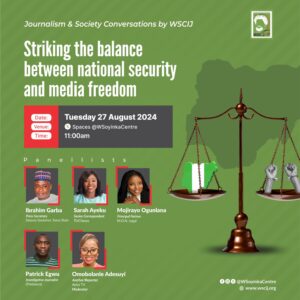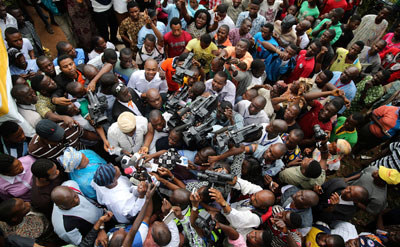Against the background of recent cases of arrests of journalists, a renewed call has been made to protect media freedom in the country.
The call was made by speakers at the Journalism and Society Conversation hosted on X space by the Wole Soyinka Centre for Investigative Journalism (WSCIJ) which highlighted the need for a balance between national security and the right to information.
The panel session moderated by Omobolanle Adesuyi, Anchor/Reporter, Arise News, featured distinguished voices in journalism and law including Senior Correspondent, TVCNews, Sarah Ayeku, Investigative journalist, Patrick Egwu, Press Secretary, Deputy Governor, Kano State, Ibrahim Garba, Principal Partner, M.O.N Legal, Mojirayo Ogunlana shared their insights on crack down on the media.

The speakers noted that journalists play a vital role in holding the government accountable and informing the public, adding that by upholding media freedom, Nigeria can strengthen its democracy and promote good governance.
According to a recent report by the Committee to Protect Journalists (CPJ), at least 56 journalists were attacked and harassed during the August End Bad governance demonstrations across Nigeria.
“It’s a dangerous time to be a journalist in Nigeria. We’re constantly looking over our shoulders, worried about being arrested or silenced,” said Ayeku
The government’s use of surveillance and censorship has also created a climate of fear among journalists. In 2020, a report by a group at the University of Toronto revealed that the Defence Intelligence Agency of Nigeria acquired spyware to spy on the activities of journalists.
Egwu said “We’re being watched. The government is trying to control the narrative and prevent us from reporting the truth.”
Despite these challenges, he said Nigerian journalists are refusing to be silenced and are using their platforms to expose corruption, hold the powerful accountable, and inform the public.
Ogulano who said the public has a right to know, added that journalists are essential for a functioning democracy.”
“It’s a delicate balance. We must protect our national interests, but we also recognize the importance of a free press,” Garba stated.
However, critics argue that the government is often using national security as a pretext to suppress dissent.
“The government is trying to create a climate of fear,” said Sarah Ayeku. “They want us to self-censor and stop asking questions.”
The challenges faced by Nigerian journalists are exacerbated by the lack of enforcement of court orders and the arbitrary actions of regulatory bodies like the National Broadcasting Commission (NBC).
Despite these obstacles, Nigerian journalists are determined to continue their work. They are using innovative methods to evade censorship and reach their audiences.
“We won’t be silenced,” said Patrick Egwu. “We will continue to fight for our freedom and the right of the public to know.”
READ ALSO: ‘How poor internet connection affects production, distribution of content’


